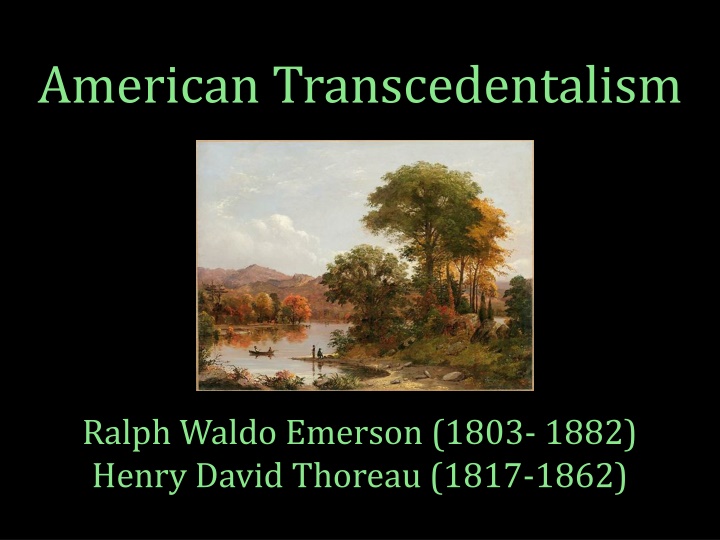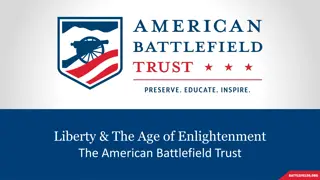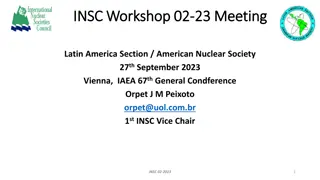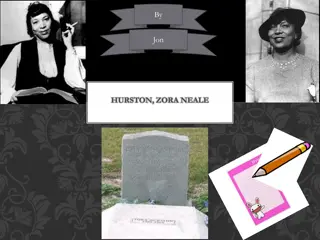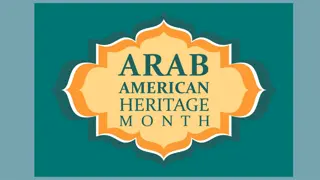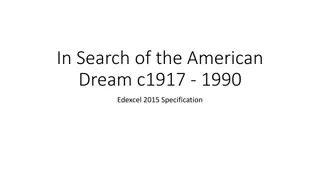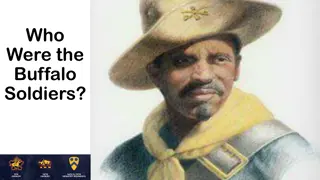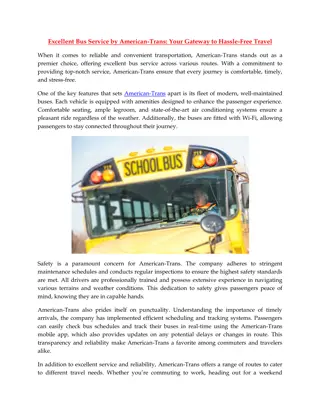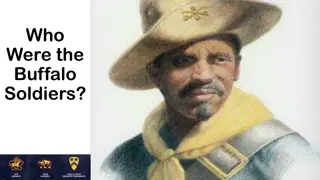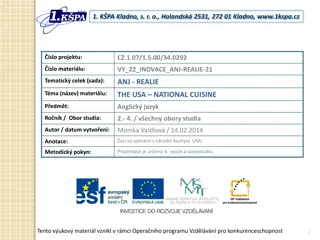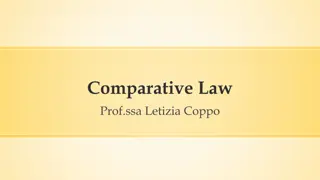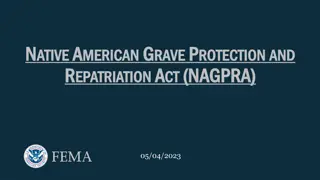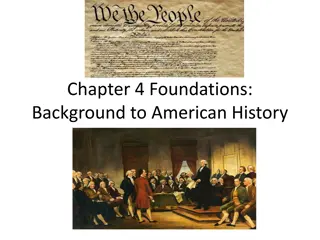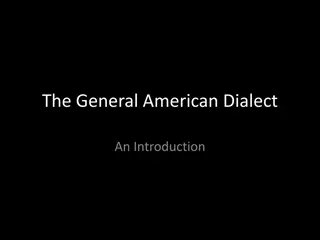American Transcedentalism
Literary, intellectual, and social movement advocating spiritual ideals that transcend the physical world. God realized through intuition and nature, not books or established religions. Spiritual, ethical, and political aspects converge for social reform. Originating from the Transcendental Club, inspired by Vedic philosophy, German Idealism, and English Romanticism. Led by influential figures like Ralph Waldo Emerson and Henry David Thoreau, the movement emphasized individuality, introspection, and connection with nature as pathways to truth and self-realization. American Transcendentalism emerged as a response to the Industrial Revolution and the Age of Reason, embodying a unique blend of romanticism, idealism, and social activism.
Download Presentation

Please find below an Image/Link to download the presentation.
The content on the website is provided AS IS for your information and personal use only. It may not be sold, licensed, or shared on other websites without obtaining consent from the author.If you encounter any issues during the download, it is possible that the publisher has removed the file from their server.
You are allowed to download the files provided on this website for personal or commercial use, subject to the condition that they are used lawfully. All files are the property of their respective owners.
The content on the website is provided AS IS for your information and personal use only. It may not be sold, licensed, or shared on other websites without obtaining consent from the author.
E N D
Presentation Transcript
American Transcedentalism Ralph Waldo Emerson (1803- 1882) Henry David Thoreau (1817-1862)
Periodisation The Colonial Period (1500-1830) The Post-Revolutionary Period of Romanticism and Transcedentalism leading almost up to the end of the 19th century. Realism and Naturalism (1870-1910) The Modernist period spanning roughly from the pre-WWI (turn of the century) years through to the interwar period and leading up to WWII The Post-war / contemporary period.
For all men live by truth, and stand in need of expression. In love, in art, in avarice, in politics, in labor, in games, we study to utter our painful secret. The man is only half himself, the other half is his expression R.W. Emerson, The Poet, 1844
American Transcedentalism A literary, intellectual and social movement advocating spiritual ideals that transcend the physical world. It asserts that God is realized by means of intuition and through nature, rather than through books or doctrines of any established religion. Spirituality, ethics and politics meet in the pursuit of social reform.
The Transcedental Club Loosely organized in 1836, in Concorde, Massachusetts Inspiration from: Vedic philosophy in India German Idealism English Romanticism The American Landscape Liberality and breadth of mind as hallmark / different meanings for different individuals
Ralph Waldo Emerson (1803=1882) Lecturer, essayist, thinker Started as Unitarian minister Founder of the Transcedental Club and editor of The Dial journal Profound inspiration for many writers, incl. Walt Whitman, H.D. Thoreau, Emily Dickinson, Herman Melville, Nathaniel Hawthorne It is said that Friedrich Nietzsche never travelled without carrying a volume of Emerson s essays with him
The Concorde Writers Top Left: Nathaniel Hawthorne. Top Right: Louisa May Alcott. Bottom Left: Henry David Thoreau. Bottom Center: Ralph Waldo Emerson. Bottom Right: William Ellery Channing
Transcedentalism AS American Romanticism Rising in reaction to Industrial Revolution, the Age of Reason but also: Protestant work ethic, Puritan depreciation of writers and the arts, Degradation ensued by urban modernization
Emerson The American Scholar (1837) Perhaps the time is already come, when it ought to be, and will be, something else; when the sluggard intellect of this continent will look from under its iron lids, and fill the postponed expectation of the world with something better than the exertions of mechanical skill. Our day of dependence, our long apprenticeship to the learning of other lands, draws to a close. The millions, that around us are rushing into life, cannot always be fed on the sere remains of foreign harvests. Events, actions arise, that must be sung, that will sing themselves.
The American Scholar Key points The old fable covers a doctrine ever new and sublime; that there is One Man, present to all particular men only partially, or through one faculty; and that you must take the whole society to find the whole man. In this distribution of functions, the scholar is the delegated intellect. In the right state, he is, Man Thinking. In the degenerate state, when the victim of society, he tends to become a mere thinker, or, still worse, the parrot of other men's thinking.
The American Scholars Influences The first in time and the first in importance of the influences upon the mind is that of nature Nature then becomes to him the measure of his attainments. So much of nature as he is ignorant of, so much of his own mind does he not yet possess. The next great influence into the spirit of the scholar, is, the mind of the Past, in whatever form, whether of literature, of art, of institutions, that mind is inscribed. Books are the best type of the influence of the past, and perhaps we shall get at the truth, learn the amount of this influence more conveniently, by considering their value alone. Action is with the scholar subordinate, but it is essential. Without it, he is not yet man. Without it, thought can never ripen into truth... The preamble of thought, the transition through which it passes from the unconscious to the conscious, is action. Only so much do I know, as I have lived.
The American Scholars Duties They are such as become Man Thinking. They may all be comprised in self-trust. The office of the scholar is to cheer, to raise, and to guide men by showing them facts amidst appearances. The scholar must be: Free from outside constraints Brave enough to withstand public disapproval Self-trusting to follow the dictates of his own nature Focused on the private life of the single person
Transcedentalism AS American Romanticism Emphasis on Imagination, Intuition, Feeling but also Revival of the Pioneer Spirit: Self-reliance Simple Living / Frugality Right of the individual to self-government
Emerson Self-Reliance (1841) Trust thyself: every heart vibrates to that iron string. These are the voices which we hear in solitude, but they grow faint and inaudible as we enter into the world. Society everywhere is in conspiracy against the manhood of every one of its members. Whoso would be a man must be a nonconformist. He who would gather immortal palms must not be hindered by the name of goodness, but must explore if it be goodness. Nothing is at last sacred but the integrity of your own mind.
Transcedentalism AS American Romanticism Individual comes first and is primarily good Man is inherently good, seeking to create. Values: individual freedom, self-awareness, conscience The necessity of non- conformity; individuals are at their best when independent and self- reliant.
Transcedentalism AS American Romanticism Love for the beauties of the natural landscape Nature is to be worshipped Leads to personal serenity and spiritual growth One can only find God in and through nature (physical nature and nature as Oversoul)
Emerson Over-Soul (1841) that Unity, that Over-soul, within which every man's particular being is contained and made one with all other We live in succession, in division, in parts, in particles. Meantime within man is the soul of the whole; the wise silence; the universal beauty, to which every part and particle is equally related; the eternal ONE
Henry David Thoreau (1817-1862) Orator, essayist, thinker, abolitionist, poet of nature Student and friend of W. Emerson July 4th1845 moved to small self-built hut around the shores of Walden pond for two years. Spent a day in prison for refusing to pay poll tax Spent final years of his life preparing journals for publication
Walden (1854) Questions of provenance, questions of genre Chapters focused on scenery observation, a single activity, description of a location Each adding to his understanding of the natural world Why should we live with such hurry and waste of life?
Walden = an exercise in solitude Transcedentalism Individualistic in character
Resistance to Civil Government/ On Civil Disobedience (1849) The government is best which governs least This American government how successfully men can be imposed on, even impose on themselves, for their own advantage. imposes taxes/labor for its own advantage impedes enterprise and education Engages in conflict and war (westward expansion, Mexican-American War) substitutes conscience Endorses and practices slavery = legal yet unjust and disgraceful All men recognize the right of revolution; that is, the right to refuse allegiance to and to resist the government, when its tyranny or inefficiency are great and unendurable. a slave s government, shameful to obey it right and DUTY to revolution (fear, apathy, compliance make one part of the problem) I ask for, not at once no government, but at once a better government. Passive Resistance and Civil Disobedience as a means of withdrawing support from the Government no taxes given = disabling the State from commit[ting] violence and shed[ding] innocent blood Accepting repercussions - freedom, obedience to a Higher Law There will never be a really free and enlightened State, until the State comes to recognize the individual as a higher and independent power, from which all its own power and authority are derived, and treats him accordingly.
